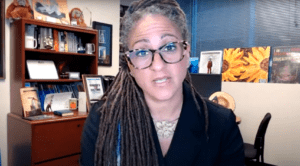Recapitulação do webinar: Principais descobertas da pesquisa "Final 10%" da EE
On April 6, 2022, Emily’s Entourage (EE) presented an informational webinar to share the findings of its inaugural global survey on the health and perspectives of people with cystic fibrosis (CF) who do not benefit from currently available mutation-targeted therapies. The results were published in Pediatric Pulmonology.
Dr. Jennifer L. Taylor-Cousar, MD, MSCS, ATSF, co-author of the research paper and EE Scientific Advisory Board member, presented key survey findings and highlighted takeaways for attendees, which included people with CF and their loved ones, researchers, clinicians, and members of the biotech and pharmaceutical industries.
In the review of the findings, three key themes emerged: the impact of CF on the mental health of both people with the disease and their caregivers; the inequities present for minorities with CF; and the challenges surrounding clinical trial recruitment and participation.
When asked about aspects of life most affected by CF, 45.5% of respondents reported “mental health” and 45.2% answered “plans for the future.”
Respondents also reported feeling “left behind” — that their mental health is being impacted not just by their CF, but by the fact that they are ineligible for treatment that such a vast majority of people with CF can access. Dr. Taylor-Cousar explained that the final 10% of people with CF who do not benefit from mutation-targeted therapies experience medical trauma, in part, as a result of this exclusion.
“What came through loud and clear is that there’s this incredible fear of being left behind. People are scared that the community was going to be satisfied with 90% and move on, and that the remarkable commitment and focus on developing CF therapies that we’ve seen over the past few years or decade was going to fade. That was very profound to hear.” – Emily Kramer-Golinkoff, co-founder, Emily’s Entourage
Dr. Taylor-Cousar also highlighted the fact that historically marginalized groups were less likely to qualify for modulators due to their mutations. For example, approximately 90% of white people with CF qualify for mutation-targeted therapies whereas only 70% of black people and 76% of Hispanic people qualify.
On the subject of prioritizing equity in clinical trial recruitment, Dr. Taylor-Cousar shared the importance of ensuring access to all people with CF, keeping in mind cultural biases that are institutionalized in our society.
Dr. Taylor-Cousar’s presentation was followed by a brief question and answer session. You can view the webinar in its entirety below.
Dr. Taylor-Cousar also answered additional questions following the webinar Q&A.
Q: What is the timeline for upcoming therapies?
A (Dr. Taylor-Cousar): For eligible participants with nonsense mutations, a trial that is examining the use of ELX-02 plus ivacaftor (Kalydeco®) is currently enrolling (*NCT04135495). A trial of 4D-710, an adeno-associated virus gene therapy that will deliver the corrected CFTR gene to the lungs, recently began enrolling (*NCT05248230). We expect that additional early phase trials of CFTR-directed therapies will begin in the second half of 2022.
Q: Am I eligible to participate in a trial if I have received a lung and/or liver transplant?
A: Unfortunately, people with CF who have undergone liver or lung transplants will most likely be excluded from participating in the majority of clinical trials of new CF therapies. When new therapies are approved, individuals who have undergone a transplant should discuss options for using new therapies with their transplant teams.
Q: Beyond new “upstream” therapies for people with rare and nonsense CFTR mutations, what “downstream” approaches are needed most?
A: People ineligible or intolerant of CFTR modulators continue to need therapies that will improve mucociliary clearance and control infection and inflammation. New approaches to treat infection and safe and effective anti-inflammatory therapies are particularly important to develop.
Q: Could rare mutations of CF be a function of underdiagnosis in minority communities due to poor screening and testing? (Perhaps they’re not so rare after all?)
A: Because CF has historically been taught to exclusively occur in those of European ancestry, understanding of the occurrence of the CFTR mutations that occur more commonly in people categorized as Black, Indigenous, and people of color is understudied. Further, evaluation for CF in countries whose populations are predominantly of ancestries other than European has been limited. Screening and evaluation for CF in such countries is likely to reveal previously missed diagnoses of CF. Less than 500 of the approximately 2,000 mutations that have been identified in CFTR have been fully characterized (cftr2.org). Continued efforts to determine the consequences of known CFTR mutations and in vitro testing of response to approved therapies will increase eligibility for therapy for everyone.
Q: What are the defining bacterial challenges for people in the final 10% of the CF population, and are they different from the other 90%?
A: For many adults with CF, their chronic infections have become multi-drug resistant (MDR). Multi-drug resistant bacteria occur in people with CF who are eligible/on CFTR modulators as well as in those who are not on modulators. Based on data from the PROMISE study (*NCT04038047), highly effective CFTR modulators such as elexacaftor-tezacaftor-ivacaftor (Trikafta®) improve mucociliary clearance. Early data from the PROMISE study suggest that there is increased clearance of bacteria in some people on therapy. It is not yet known if early bacterial clearance for those on elexacaftor-tezacaftor-ivacaftor (Trikafta®) will be sustained over time.
Q: What are the biggest barriers to treating the remaining 10% of people with CF?
A: For most of the history of CF management, we have focused on treating the signs and symptoms of CF. CFTR modulators are the first therapies that affect some of the basic defects caused by CFTR mutations. These small molecule therapies treat the protein defect. Many people with CF who are not eligible for modulators based on their CFTR mutations do not produce CFTR protein, and therefore may require gene therapy to address the basic defect. Some of the major barriers to gene therapy include 1) understanding to which airway cells it is most important to deliver gene therapy, 2) development of a transport system that delivers a sufficient amount of the corrected gene, and 3) ensuring that the gene therapy is safe/does not cause an excessive immune response.
*clinicaltrials.gov
All information shared in Dr. Taylor-Cousar’s Q&A is accurate as of May 5, 2022.
Are you interested in getting involved in CF research? Join our CF nonsense mutation patient registry.


